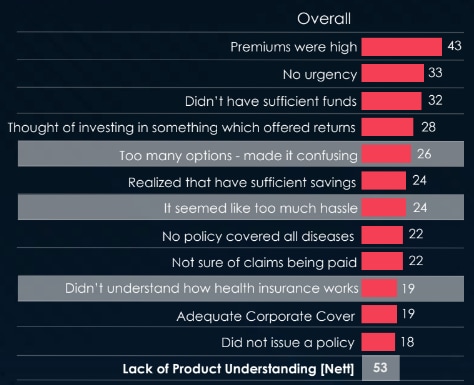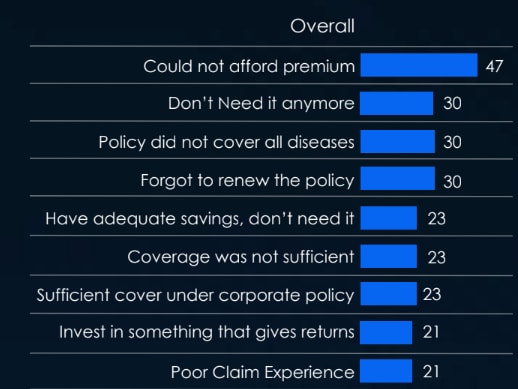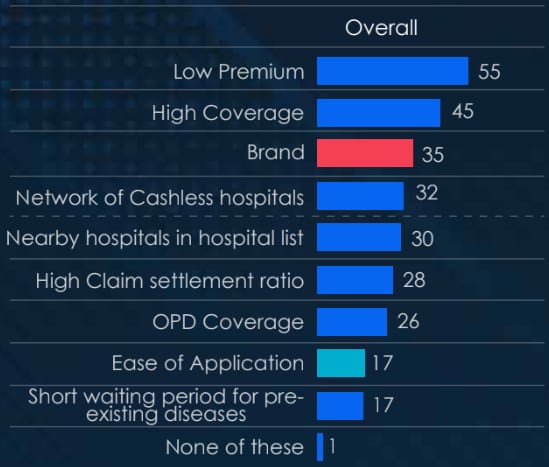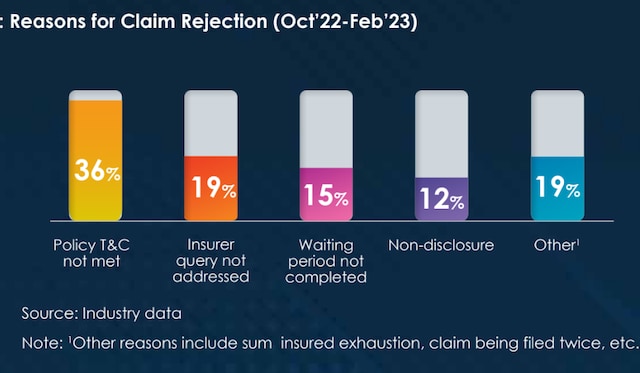Why Indians stay away from health insurance
The study, titled ‘How India Buys Insurance’, reveals that high premiums are preventing individuals from obtaining insurance cover, or in some cases, adequate insurance coverage. benefits. In 2021, India registered the highest medical inflation rate among the Asian countries at 14 per cent.
Here are the top reasons for people not purchasing a policy ( All figures in percentage)

Top reasons for people not renewing their policies ( All figures in percentage)

The sample size for the survey was 3,327 people across 27 cities in the country.
The study called for simpler insurance products with ‘key benefits minus the frills’ as a useful step in ensuring that affordability does not keep anyone from staying protected.
Price value equation was highly important for both buyers and non-buyers of health insurance. When evaluating which health insurance policy to purchase, a majority
Evaluation Parameters for Purchase ( All figures in percentage)

Network of cashless hospitals [including having a large network (32 per cent) as well as inclusion of nearby hospitals (30 per cent)] and Brand (35%) were the two other key criteria based on which the respondents made their purchase decision.
While promise of better claim support at the time of purchase affects people’s choice of channel, the actual experience of claim decides whether they will continue to stay covered under a health insurance policy, revealed the survey.
Typically, people tend to lose out on claims due to:
-
Not knowing the policy term & conditions (e.g., exclusions, waiting periods or sub-limits) -
Not being able to provide adequate responses to insurer queries -
Waiting period not completed

“Despite the obvious advantages of insurance and the aftermath of the Covid-19 pandemic that rattled all of us, India continues to have one of the lowest penetration levels of insurance products in the world. The mortality protection gap stands at 91% and the health protection gap is pegged at 35%,” said Sarbvir Singh, CEO, Policybazaar.
According to IRDAI, only around 52 crore Indians have some kind of health cover through state-run schemes, social insurance schemes, and private insurance. This leaves a sizeable population without any adequate health protection.
At the geographical level, the importance of health insurance was less recognised in tier 3 towns as compared to the metros, indicating a higher need for education. Demographically, people seemed to recognise the importance of health insurance as they approach 30 years of age.
At least 55 per cent of those who owned a health insurance policy had been influenced by an agent vs. 44 per cent of those who did not purchase the policy.
A higher proportion of non-users tended to be triggered by fear. While fear induced them to consider purchasing a health insurance policy, it was not a strong enough trigger to induce purchase.
South and West financially more prudent
Apart from push, the need to be covered under some policy (corporate, parents’ or own) was a top trigger for purchase of health insurance in South.
Respondents in the West were more likely to start considering health insurance purchase when they started a family (41%) than those in the other regions of the country (33% overall).
Also, life stage changes motivated significantly lower proportion of people to consider health insurance in tier 3 cities (22 per cent) as compared to those in metros and tier 2 cities (33 per cent overall).
Word-of-mouth and online sources used in tandem by majority for research on health insurance products
Friends and family played a vital role in getting the conversation started as well as in policy recommendations. Even in cases where respondents trusted their agents for recommendations, over 57% respondents did so because someone they knew had recommended the agent. However, a large majority of respondents (79%) also sought out online sources to make a more informed decision.
Google and YouTube formed the core of online search with 65% respondents citing browsing through them to get more information on health insurance.
Personal recommendation from friends and family or a known agent is the top trigger for insurance consideration for approximately 80 per cent of the respondents. For 56 per cent, a recommendation from friends and family was the main trigger for purchasing health insurance, while the number stood at 54 per cent for life insurance.
Around 80 per cent of respondents across health and life insurance looked online for information before purchasing the policy. However, over 85 per cent ended up purchasing offline primarily through an agent they knew or was recommended by friends and family.
 Loan, Personal Loan, Home Loan, Business Loan,Loans in India Loan in India, Personal Loan, Home Loan, Business Loan, Loans in India,Loan Finance,Loan in India, Get Instant Personal Loan,Home Loan, Business Loans in India
Loan, Personal Loan, Home Loan, Business Loan,Loans in India Loan in India, Personal Loan, Home Loan, Business Loan, Loans in India,Loan Finance,Loan in India, Get Instant Personal Loan,Home Loan, Business Loans in India